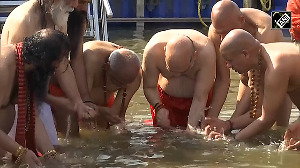 Atsushi Toyoshima's choice of Sunny's for our lunch seems a good beginning. To the lovers of continental food in cosmopolitan Bangalore, Sunny's is a place of pilgrimage, made better through its relocation at a vastly more spacious address. It is all glass, straight lines and white, with natural light streaming in all around.
Atsushi Toyoshima's choice of Sunny's for our lunch seems a good beginning. To the lovers of continental food in cosmopolitan Bangalore, Sunny's is a place of pilgrimage, made better through its relocation at a vastly more spacious address. It is all glass, straight lines and white, with natural light streaming in all around.
The managing director of Toyota Kirloskar takes time to order an Australian white wine, Green Point Chardonnay that goes down very easy, neither too sweet nor dry. He then engages in a little "negotiation" with the waiter, as they have to improvise what he is looking for.
Eventually, he has a melon with Parma ham (melon and ham) for starters, Spanish fish soup and spaghetti pomodoro (tomato) for the main dish. I, not wanting to miss the opportunity, go straight for lamb chops well done. They are as tender as I have known, the whole experience marred a little by a persistent fly.
He likes both vegetarian and non-vegetarian Indian food, but for Japanese food he has to rely on most ingredients being brought in from Bangkok and Singapore. So there are three refrigerators in his home with one big enough to hide a whole human body.
Toyoshima is a typical and not so typical Japanese. He entered Kyoto University for undergraduate science studies but after two years atypically shifted to literature.
Like most good Japanese, he is informed up to the minute on happenings in Japan. We realise the upper house of the Diet is right then determining the fate of the Koizumi government and he predicts correctly that if the vote is lost it will be elections and possibly a split in the ruling LDP.
He readily declares that had the reforms, which Koizumi has made the raison d'etre of his government, been pursued in right earnest through the 1990s, the Japanese economy would not have suffered the way it has.
I find it irresistible not to seek a first-hand account of the Toyota way and how it has come to be a global benchmark for manufacturing. He recalls that Toyota had always tried hard to catch up with GM and Ford, "respected them and learnt a lot from them."
Eventually, it turned out, catching up was the easy part. The bigger challenge was bringing in different values. The essential approach has been that volume and market share (Toyota is now the most profitable and the second-largest car company in the world) will come naturally if you fix your eyes on continuously offering better value to customers and treating them well.
Toyota's official vision is a 15 per cent share of the global market by 2010. But that is just a convenient number. The key internal focus has been set by the new president who has identified three goals: offer drastically better value in terms of environment, safety, quality and cost; contribute to the economy; and give something back to society through non-business activity (corporate social responsibility).
He sees a change in India and has an observation to share. The number of Indian manufacturing companies applying for and winning the Deming prize (named after an American expert who helped post-war Japan set out on the holy grail of quality) is indication of the desire for excellence.
But to get there you have to rely on "team work" and not "individualism", not follow the top-down approach. In the US, powerful leaders show the way, "for us, the top management is in charge of coordination."
The top management should not say do this, it is the shop floor workers who should identify the problem and show the way to change. "Those lower down must have ownership of the process.
"There must be a common understanding on expansion plans, where our salary is coming from, where prosperity is coming from." GM has brought down its work force from 800,000 to 200,000. If management and labour fight, then the business loses competitiveness and has to be downsized.
On Toyota's Indian plans, Toyoshima remains classically Japanese by revealing as little as possible. It is seriously studying small car production but that study is yet to conclude.
Meanwhile, the priority is to reinforce production capabilities and the dealer network, ensuring there are enough capable sales and servicing people to do the job that will be taken on. A lot of improvement has to come in both human and physical infrastructure.
On competition in the Indian market, I tell him what my Maruti friends told me when the Koreans came: This is not the real challenge; that will come when Toyota comes. Toyoshima figuratively bows in return for that bow and says, "Maruti 800 did to India what the Ford Model T did to the US -- brought car-owning to a class of people who would not have otherwise owned a car." Then the key line, "We in Japan have very strong respect for Osamu Suzuki."
Toyoshima likes his double espresso with a scoop of green tea ice cream, I stick to my cappuccino. The conversations turns to Indian driving conditions and he reveals that the first investment decision he took on coming to India was to set up a test track, which is where he drives.
I reveal that I drive a Tata Indigo, which I term as a poor man's big car. He knows that Azim Premji has replaced his aging Ford Escort with a Toyota Corolla and as we depart he listens carefully to my suggestion that Toyota Kirloskar can include in its CSR agenda schools to teach everyone good driving, as Maruti has done.






 © 2025
© 2025